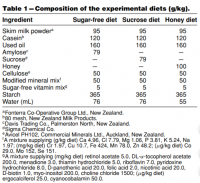nomoreketones
Member
- Joined
- Apr 8, 2016
- Messages
- 1,238
The long-term effects of feeding honey compared with sucrose and a sugar-free diet on weight gain, lipid profiles, and DEXA measurements in rats. - PubMed - NCBI
The long-term effects of feeding honey compared with sucrose and a sugar-free diet on weight gain, lipid profiles, and DEXA measurements in rats.
Chepulis L1, Starkey N.
Abstract
To determine whether honey and sucrose would have differential effects on weight gain during long-term feeding, 45 2-mo-old Sprague Dawley rats were fed a powdered diet that was either sugar-free or contained 7.9% sucrose or 10% honey ad libitum for 52 wk (honey is 21% water). Weight gain was assessed every 1 to 2 wk and food intake was measured every 2 mo. At the completion of the study blood samples were removed for measurement of blood sugar (HbA1c) and a fasting lipid profile. DEXA analyses were then performed to determine body composition and bone mineral densities. Overall weight gain and body fat levels were significantly higher in sucrose-fed rats and similar for those fed honey or a sugar-free diet. HbA1c levels were significantly reduced, and HDL-cholesterol significantly increased, in honey-fed compared with rats fed sucrose or a sugar free diet, but no other differences in lipid profiles were found. No differences in bone mineral density were observed between honey- and sucrose-fed rats, although it was significantly increased in honey-fed rats compared with those fed the sugar-free diet.
Last edited by a moderator:

